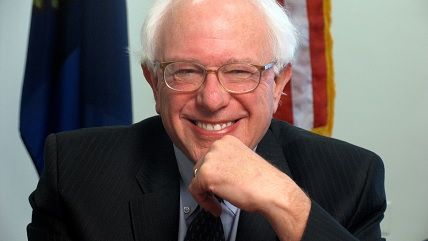Bernie Sanders Is Right on Marijuana, But Not Enough
Time to treat pot like alcohol.

While it's hard to pinpoint accurately, estimates place the current number of Americans in Alcoholics Anonymous at more than 1.2 million. AA members meet often; today alone there will be more than 50 AA meetings within a 50-mile radius of downtown Richmond. Attend just about any of them and you likely will hear personal testimonies about the shocking degree of human misery alcohol can inflict.
If you prefer data to anecdotes, consider this: The Centers for Disease Control reports that from 2006 to 2010, "excessive alcohol use led to approximately 88,000 deaths . . . shortening the lives of those who died by an average of 30 years. Further, excessive drinking was responsible for 1 in 10 deaths among working-age adults aged 20-64 years. The economic costs of excessive alcohol consumption in 2010 were estimated at $249 billion."
Yet there are 10 state liquor stores within just a four-mile radius of downtown Richmond, and hundreds across the state. Virginia's Department of Alcoholic Beverage control actually boasts about how much liquor it sells: "The agency is a leading revenue producer for Virginia and the source of future economic growth and innovation for the state," it crows. "Virginia ABC has contributed $8.6 billion to the Commonwealth's general fund."
And that's just liquor stores. There are who-knows-how-many grocery and convenience stores where you can buy beer and wine. More than half the adults in Virginia and across the country have enjoyed at least a drink or two in the past month - and nearly half of those consumed five or more drinks in a sitting - mostly without consequence.
Once upon a time, almost a century ago, the United States decided the social costs of drinking were too high, and imposed Prohibition. It didn't work out well. Though alcohol consumption dipped briefly after Volstead it soon recovered, thanks to Prohibition's creation of a vast underground trade, largely run by organized crime, that flourished despite steep increases in government spending on alcohol control. Bootleggers concentrated more on hard liquor because it was easier to conceal and transport, and the lack of production standards quadrupled the number of deaths from poisoned products.
Eventually the public wised up. Americans realized that while alcohol causes many problems, banning alcohol does not solve those problems but does create other ones. Almost nobody today would insist the government should forbid Smith to take a drink because Jones has a drinking problem.
Now the public is wising up about the folly of marijuana prohibition. In 1990 Americans favored prohibition 81 to 16 percent; today Americans favor legalization 52 to 45 percent. Politicians, however, are still playing catch-up.
Last week at George Mason University Sen. Bernie Sanders (I-Vt.), a Democratic presidential candidate, recommended a sensible if modest step: removing pot from the list of Schedule I substances, where it now sits alongside heroin and LSD because of the federal government's official but false contention that it has no redeeming uses and can inflict severe physical dependence. Sanders said pot policy should be left to the states.
This is a move in the right direction, albeit a small and timid one. A proper policy would treat marijuana like alcohol (which, unlike pot, can be physically addicting). But at least Sanders has the right idea. Hillary Clinton supports medical marijuana but straddles the fence about recreational pot. The Republican presidential candidates, meanwhile, are mostly stuck in the past.
Republican presidential candidate Ben Carson wants to "intensify" the war on drugs; Gov. Chris Christie (R-N.J.) has frequently fulminated against recreational marijuana. Sen. Marco Rubio (R-Fla.) flatly opposes pot legalization, and Republican Carly Fiorina opposes it "for a whole host of reasons," though she says states should be able to legalize the stuff if they want. That is essentially the same view as that of Republican presidential candidates Sen. Ted Cruz (Tx.), Jeb Bush (Fla.) and Mike Huckabee (Ark.). Gov. John Kasich (OH) opposes even medical marijuana. Sen. Lindsey Graham (S.C.) says marijuana should remain illegal even if it is only "half as bad as alcohol" (!). Even Sen. Rand Paul (Ky.) has been noncommittal about legalization, although he thinks the feds should butt out and penalties should be lower. Gov. Bobby Jindal (La.) might be open to persuasion. (Rick Santorum, George Pataki and Jim Gilmore all oppose legalization and Donald Trump is, as usual, incoherent.)
This is exceedingly odd from a party that claims to venerate individual freedom; abhors big government; mocks liberal paternalists who think government should protect people from themselves; celebrates the free market for meeting consumer demand; and praises (pardon the term) budding entrepreneurs such as those in the marijuana industry. There is not a single conservative argument for pot prohibition consistent with those values, and if liberals ever argued for outlawing tobacco or alcohol for the same reasons that conservatives support marijuana prohibition, conservatives would vilify them as stormtroopers of the nanny state. And they would be right.
Perhaps one of these days conservatives will wake up and realize what they sound like. Fingers crossed, eh?
This article originally appeared at the Richmond Times-Dispatch.


Show Comments (43)